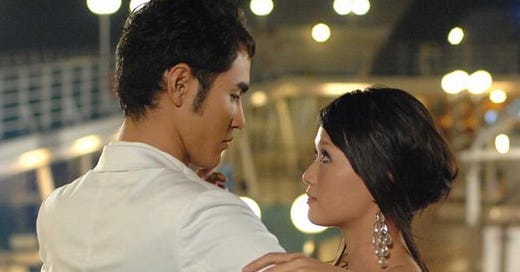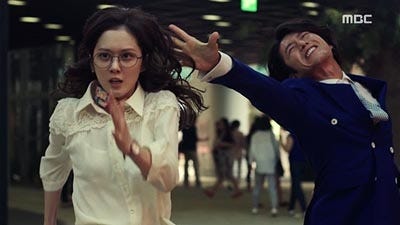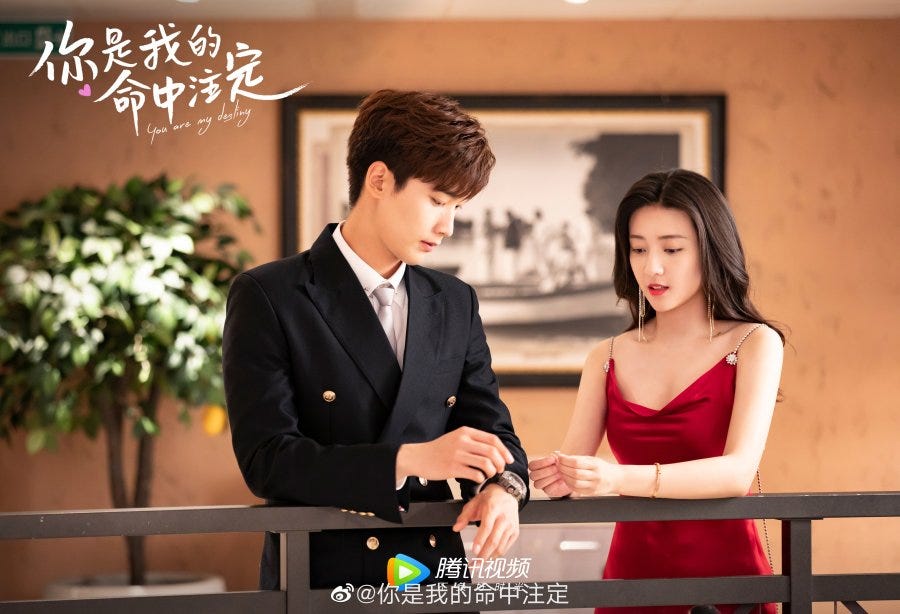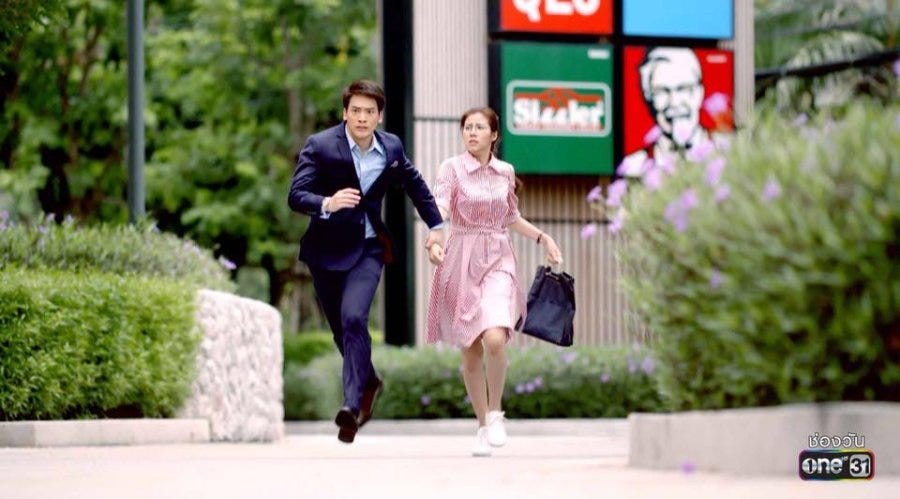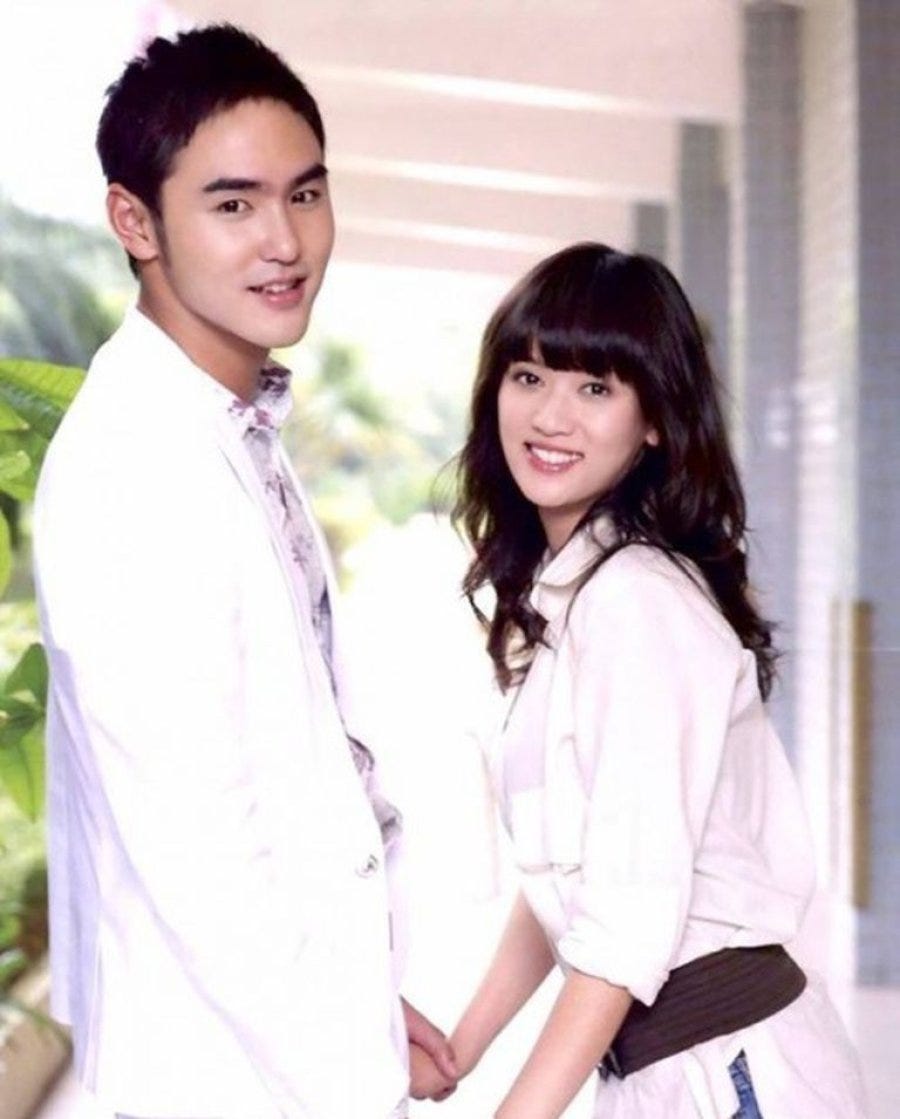Why I love Fated to Love You (2008) (2014) and seldom end up rooting for the other guy
Some weeks ago I read a comment on another platform that someone had only recently caught the South Korean adaptation of this hugely popular Taiwanese series, Fated to Love You. This particular commenter ended her journey with the drama when the leads went their separate ways and the female lead followed the other male lead out of the country to fulfill her artistic aspirations. S/he decided that this was her/his preferred ending with the female lead enjoying the happily-ever-after she deserves with the man who actually deserves her. In response to that meta, someone else noted (rightly I might add) that by not watching the rest of the drama (another five or six episodes), s/he was missing out on so much more. Inwardly I agreed with the responder at the time but I didn’t have the time or inclination to say my piece to back that statement up. Fated to Love You in all its manifestations have a special place in my heart mainly because it’s not just another take on the overused irascible CEO trope. Nor is it just another straightforward contract relationship story guaranteed to provide laughs and feels.
More recently I completed Master of My Own which also features what can be loosely called a love triangle starring yet another cantankerous CEO male lead. Because the leads are off to a really bad start in the romance stakes, a comment that often came up was that neither of the male leads deserved the female lead (Ning Meng) because they were both cads in their own right. Part of the reason I suspect was that Ning Meng was written as a rather idealised female figure — capable, kind, sensible and optimistic. Over the weekend I stumbled across a J movie called Daytime Shooting Star about a girl who becomes infatuated with her homeroom teacher and later find herself in a middle of a love triangle with him and a male classmate. It has some of the hallmarks of a CEO drama but it doesn’t quite gel. Initially feigning indifference, the teacher racked with jealousy (I imagine) later confesses to have feelings for her too and against everything that is considered ethical, acts inappropriately. Apparently it’s some kind of manga tradition but in some parts of the world what the teacher does is a clear infringement of professional code of conduct. Teachers have been hauled up in front of police stations here for doing much less. However judging from the comments I saw, there were people rooting for him because it is enough that his feelings for her were “deep” and “real”. Luckily for all concerned she develops a deeper and genuine affection for her male classmate who turns out to be a far more thoughtful soul than anyone realises.
Often when people take sides in a love triangle, a significant proportion of the population barracks for the so-called “second” male lead hence the pathology known as Second Male Lead syndrome. In some stories it’s even hard to know who it is that’s supposedly the second male lead until there’s a clear conclusion as to which lad ends up with her. I imagine is that the predominantly female audience often falls in love with such an idealised figure because he is finely calibrated to be attentive to the needs of the female lead. Sometimes though as we see in Master of Our Own, his attentiveness is a cloak to something less desirable a la Mr Wickham. Fortunately it’s not a malaise that strikes me often but if the writing of the male lead is half decent, it is almost never an issue.
Everyone has their favourite version of Fated to Love You or You Are My Destiny but the over-the-top nutty Taiwanese version is is mine because I dig the humour and I suppose it’s the first one I saw. The others tend to go completely melo at that crucial moment and stay that way for the most part. The C drama version which starts off well just drags out the push and pull to the point where the female lead becomes unlikeable. My favourite thing about the franchise but especially the original is its unabashed celebration of life and family. All of them follow roughly the same trajectory — a CEO who has been stood up by his longtime girlfriend during a planned cruise meets a badly exploited office drone who is on board with a guy she likes from work. The two accidentally end up in the same room, and after mistaking each for their partners through some underhanded room switcheroo trickery end up spending the night together. The pair wake up in horror of what’s occurred during a drug/alcoholic-induced haze and after giving the two-timing work colleague his just desserts at the card table, go their separate ways expecting never to meet again. Three months later, the female lead discovers she is pregnant and word gets around fast. The male lead is backed into a corner but finally relents to a marriage contract which sees them both spending a lot time together in his fabulous mansion with a grandmother who is eager for progeny. Living at close quarters means that as the male lead gets to know the female lead, and they both inevitably fall for each other despite the fact that there’s the spectre of the ballerina girlfriend in the background. Entering the picture is also Dylan/Daniel who pities the female lead in her predicament and also falls for her eventually. Because the male lead is torn between his fairweather girlfriend and his growing feelings for the mother of his child, he wavers consistently between pity and resentment. Each version has their own rationale for splitting up the leads when the female lead loses the baby in a car accident. She leaves to pursue her artistic endeavours and he rues the day. Losing the child in such dramatic fashion leaves a huge gaping wound in both and they never really get over it. Or each other. Time skip and the two meet again under very different circumstances. The female lead is an up and coming young artist who is doing well. Dylan has proposed but she’s still not ready. In front of the male lead she puts on a show of confidence — that she’s moved on without him and doing really well. She is certainly doing well in her newfound career but she hasn’t moved on from him at all with all kinds of unresolved baggage between them. He thinks she’s moved on. She thinks he’s moved on.
The reason why dropping the drama when she leaves for overseas is premature because it makes the love triangle the main thing. Or more crudely put, it makes this show about choosing the “right” or “best” guy which the original story was never about. Moreover, I contend that most love triangles aren’t about the female lead choosing the “best” guy. It’s always about the One the female lead wants to spend the rest of her life with even if he is marked by plenty of rough edges. The original version does this so well because the male lead is genuinely confused about which woman he loves. He vacillates a fair bit and initiates the push-pull in those early days: The former girlfriend or the one that he’s only spent a few months with? That’s why she never knows for certain if he ever really cares or going through the motions for its own sake. When he realises his own heart, it’s rather too late. Or so he thinks. The purpose of the love triangle at least in this franchise was always about facilitating the female lead’s growth although it never brings complete healing . She never gets over her heartbreak losing her child and the pain of being “abandoned” by the father of her child when she needed him most. Worst still, she labours under the impression he never wanted the child because of the machinations of some. The loss and the guilt that haunts him marks the second phase of their relationship.
Fated to Love You is a journey about two strangers who otherwise would never have met falling in love while bonding over being prospective parents. The male lead is grudging at first about being forced into a contract marriage with a simple country girl while he is still nursing hopes of reconciling with his less committed girlfriend who gave him up for the opportunity of a lifetime. The so-called second male lead, Dylan or Daniel is a shoulder to cry on but never a shoulder to lie on. His job is simple: to support the female lead in her career and never have his feelings reciprocated no matter how “good” he is to her. He loves her and he sacrifices his own desires because he wants her to be happy. But even he can’t heal the hole in her heart because he has no idea what it’s like to lose a child in such dramatic fashion.
Most romance writers understand one thing at least. When two people are attracted to each other and develop feelings for each other, the word “deserve” doesn’t belong in that conversation. Often when there’s a love a triangle in a C drama, the rejected female lead poses this question to the often outstanding male lead: “What does she have that I don’t have? What is it about her that’s better?” The assumption behind the question is that love is somehow earned like everything else in life. School grades, qualifications, friendships, even respect. A good work ethic is respected in most cultures and achievements are lauded justifiably everywhere. Love, on the other hand, is a different beast. It’s seldom earned. It’s almost taboo to think that it can be. It has to be given… freely. Human beings, made in the image of God, know this and understand this very well.
In the last decade I’ve been reading Pride and Prejudice at least once a year and as I get older I am struck by how very imperfect Elizabeth Bennet is. As a much younger reader I glossed over her flaws because I admired her wit and strength of character. I still love her for both but yes, she did allow herself to be led by Wickham when she barely knew him and was ready to believe all that fell from his lips regarding Darcy. Of course Mr Darcy was also at fault too for belittling her and being arrogant to boot. His first proposal was guaranteed to fail because his attitude was woeful. What I am getting at here is that we don’t have perfect leads in Pride and Prejudice so why should we expect the leads in any other romance to be good enough to “deserve” each other. It is afterall the universal template for the vast majority of romances.
(If you’ve never watched any version of Fated to Love You, you might want to stop here because I’ll be dishing out big spoilers from here on end.)
In the Korean version, Lee Geon is saddled with an incurable hereditary condition. The Thai version follows a similar trajectory. His father was afflicted with it and it tore his family apart. When symptoms emerge, Lee Geon, deliberately plays the cad and rejects the female lead in his feeble attempt to protect her from the consequences of having to live with him “in sickness and in health”. While the sentiment is lamentable, it is nonetheless a form of noble idiocy because he takes away her agency to choose. His position is understandable because he fears the worst — either the pain of being rejected by her when she knows or the prospect of causing her pain as his condition deteriorates and he loses his mental faculties. Yet he is inescapably drawn to her try as he might to keep out of sight. However, his odd behaviour confuses her and because she’s the last person to know anything of importance, she lives with resentment and anguish about how things ended with them. It’s a trade-off that he’s chosen because he thinks it’s preferable to the alternative. Eventually she finds out because everyone else is moved by their great love for each other and feels the need to prod things along. They finally have the conversation which they should have three years earlier.
Look, Kim Mi-young. This disease is not a joke. I don’t know when I will not be able to remember you or when my body will be paralyzed and I am rendered immobile. When there’s a ticking time bomb inside me, how can I ask you to stay with me so shamelessly?
Why? It doesn’t matter to me. Then Geon, if there is a ticking time bomb that is attached to my body, will you just abandon me and run away?
That makes no sense? How does that make any sense? If I have a pair of scissors, I will cut every red line, blue line or coloured lines of the rainbow. If that doesn’t work out, I will see your face for the last time, hug you. After I’ve done everything, we will explode together. How do you think that makes sense?
See. You will do the same. Why are you telling me that I can’t do that? Do you think I can just abandon you?
Even before she responds, he realises the logical force of her point. His own analogy is turned against him so he feels the full weight of the argument. This is what real love is about. We get it. Real love is the giving of self for the good of the other. He is prepared to make the sacrifice and so is she because she loves. It has nothing to do with whether Daniel is the better man or he is. He might well be but that’s not the point. Love makes people do incredible things that they wouldn’t do normally. It is followed by demonstrable actions that go beyond duty. It causes a proud man like Mr Darcy to set aside his pride to do what repulses him. It causes a woman like Kim Mi-young to stay loyally by the side of a man who may or may not lose his mind one day.
The Taiwanese version which has almost an entirely different trajectory has a male lead who might be less likeable because he is somewhat resentful at being trapped between an old love and a new one. Cunxi has no illness to excuse him for causing Xinyi to feel rejected but it is clear that he is falling for her in spite of himself and when Anna returns from overseas suddenly, the ship that was sailing well heads into rough waters, in large part due to Anna’s manipulative interference and in part about Cunxi not realising which woman he loves at that crucial moment when it would have made all the difference in the world.
In all instances it is the unborn child that brings them together. In all versions, preparation to be a dad causes him to realise an inner yearning to build his own family and having a woman beside him who is equally excited about parenthood makes her all the more attractive to him. Anna/Sera clearly put her career ahead of him and that was her choice. In the end, their goals are incompatible and their lives have moved off in different directions. When she returns and sees that she’s lost him, she tries to manipulate her way back to his affections which unintentionally leads to tragedy. The Taiwanese and C versions stress the loss of the child as a far more significant reason why the leads separate for however-many years that they do. The villain here is Anna who doesn’t understand how it is that Cunxi is head over heels with Xinyi only after spending 3 short months with her when their relationship spans 5 years in total. As he tells her, it’s not the time spent that makes the difference but what happens to him in that 3 months. There was a time when he wanted desperately to marry Anna and was ready to propose but she never shared that urgency in any meaningful way to prioritize being with him. It was only when the ballet thing didn’t work out as planned that she decided to go back to him. He wanted a family, she didn’t. It was as simple as that.
Fated to Love is undeniably about our innate desire for family and the relative success of any version is correlated with how much the writers understand that to be the case. It is also a counter-cultural perspective. The male and female lead are family not necessarily by preference but certainly by choice. Circumstances and an inner voice drive them to make what is an unusually difficult one. They could of course take the path of least resistance but they don’t. Theirs is a hard road. In so doing they discover things about each other, themselves and a whole new side to life that they didn’t know was possible.
